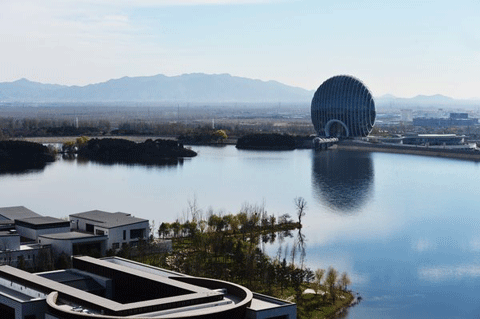Changing the face of real estate in Angola
Updated: 2014-11-17 10:17
By Li Jing(China Daily)
|
||||||||
Construction company looks to the future with satellite city project in Luanda
Since Angola's civil war ended in 2002, Africa's second-biggest oil producer has surged economically, with a 5.1 percent growth rate in 2013.
The government has invested heavily to rebuild the nation's infrastructure, in an effort dubbed by the leaders as "national reconstruction". Construction of new roads, railways, schools and hospitals has cost tens of billions of dollars.
With its abundance of resources that include crude oil, diamonds and gold, the southern African nation has seen scores of China's State-owned enterprises and private companies enter its borders hoping for an economic opportunity.
In 2008, CITIC Construction Co, a State-owned enterprise and one of the largest construction companies in the world, joined the nation's reconstruction efforts.
"We are an active and responsible player in the country's post-war reconstruction process," says Liu Guigen, president of the African regional division of CITIC Construction Co, a division of China International Trust and Investment Corp.
That year, the company won a bid to build housing in Kilamba Kiaxi, one of the capital city of Luanda's six urban districts that is located 30 kilometers from downtown.
It would eventually transform the rural area into a satellite city, a residential area located near a metropolis that is somewhat independent economically.
After CITIC completed the first phase of the project in 2011, the development spanned an area of 88,000 square meters. It is reportedly one of the largest newly built projects on the continent.
Last year, the $10 billion project was completed with a total of 20,000 residential homes, 200 retail stores, 24 kindergartens, nine primary schools and eight middle schools. CITIC claims 90 percent of the homes are already occupied.
Angolan President Jose Eduardo dos Santos hailed the satellite city project as a model for the country's post-war reconstruction.
CITIC Construction, which was tasked with mapping out the satellite city's overall development strategy, worked with about 40 other enterprises from China to install water, sewage and electricity systems.
The companies then set up a 300-strong team to train Angolans on maintenance and security work for the neighborhoods.
"The (training) services help build up a good business image," Liu says.
 |
 |
| Qatar investment arm, CITIC plan $10 billion drive | Developers discover room for growth overseas |

 APEC venues open to tourists
APEC venues open to tourists
 SpongeBob gets iced, via Harbin
SpongeBob gets iced, via Harbin
 Animal gifts smooth diplomatic relations
Animal gifts smooth diplomatic relations
 Lovers wed en masse
Lovers wed en masse
 Peng Liyuan visits Queensland Museum in Brisbane, Australia
Peng Liyuan visits Queensland Museum in Brisbane, Australia
 Small businessman's Chinese Dream
Small businessman's Chinese Dream
 First ladies cuddle up to koalas
First ladies cuddle up to koalas
 90's generations girls strive for their artistic future
90's generations girls strive for their artistic future
Most Viewed
Editor's Picks

|

|

|

|

|

|
Today's Top News
APEC venues open to tourists
Remembering a great poet and his love of China with a statue and a reading
SpongeBob gets iced, via Harbin
China’s high-speed train technology stars at exhibit in Brazil
Chile builds on trade with China
Chinese companies seek marketing slam dunk with Nets
Animal gifts smooth diplomatic relations
Koalas steal the show at G20 in Brisbane
US Weekly

|

|







